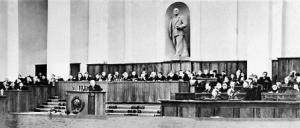On this day in 1956, before a closed session at the 20th Congress of the Communist Party of the Soviet Union, Nikita Khrushchev delivered his sensational speech, On the Personality Cult and its Consequences – or the “Secret Speech” as it would go down in history. In a sustained discourse lasting some four hours, the new leader of the Soviet Union carried out the unthinkable when he unreservedly denounced his predecessor Joseph Stalin – dead for only three years – exposing his boundless crimes against his people, party and country. The gob-smacked delegates listened as Khrushchev voiced what no one had hitherto dared: the so-called ‘great leader of progressive mankind’ had been the murderous architect of the Great Purge – the unfathomably large-scale persecution and execution of Communist Party officials and Red Army leadership. Khrushchev furthermore accused Stalin of unleashing mass terror on millions of innocent Soviet citizens, of violent nationalism and anti-Semitism, and committing serious blunders in state leadership – notably his misguided alliance with Hitler at the start of World War II. And central to all of Stalin’s crimes, Khrushchev proffered, was the self-creation of his own ‘personality cult’: “It is impermissible and foreign to the spirit of Marxism-Leninism to elevate one person, to transform him into a superman possessing supernatural characteristics akin to those of a god.”
At last, the murderous tyrant had been outed! For the delegates of the 20th Congress, Khrushchev’s speech was so shocking that some suffered heart attacks there and then. Others would soon commit suicide. For the implications of Khrushchev’s mutiny were enormous. The open denunciation of Stalin would cast doubt on the very legitimacy of Soviet communism. It was after all under Stalin’s 30-year leadership that the Soviet system had taken shape in its essential form.
And indeed when abridged versions of the speech began to trickle out soon afterwards, all hellski broke loose. Riots broke out in Georgia – Stalin’s home state – as furious crowds called for independence from the Soviet Union. In China, Mao was repulsed by what he deemed a display of weakness and accused Khrushchev of being a ‘revisionist’. The West, meanwhile, was equally shocked by the speech’s openness and hints at liberalizing the USSR. But while America was content to watch and wait, the Eastern Bloc was quick to capitalise (sic) on Moscow’s disunity. By the autumn both Poland and Hungary would explode. The Hungarian Revolution ignited a round of ruthless power struggles in Moscow, which Khrushchev just about managed to survive – but only by abandoning his vision of reform and suppressing the uprisings with a brutal, Stalin-like heavy-hand.
Khrushchev held on to power for another seven years until he was finally ousted in 1964. But on that momentous evening in 1956, he unwittingly opened Pandora’s box. So incendiary was this speech that, at the time, Israel’s Moshe Dayan predicted the USSR would implode and disappear in three decades. He was only five years off.



One Response to 25th February 1956 – Khrushchev Outs Stalin